
or
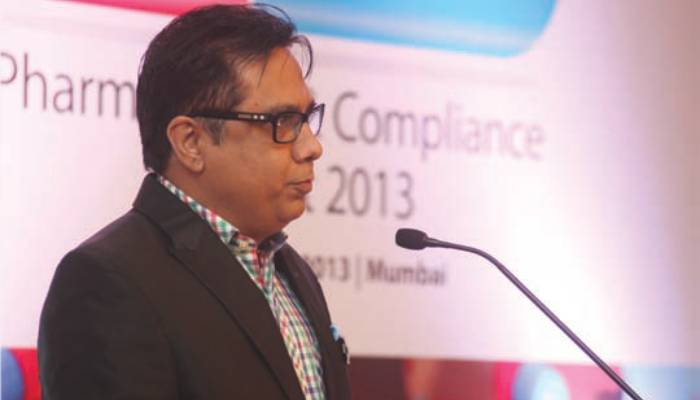
The second annual Pharma Legal Compliance Summit (PLCS) 2013 was held in Mumbai on September 27, bringing together myriad players and best minds from the legal and pharma industries under one roof to discuss issues of imminent interest.
The event was organized by Lex Witness, India’s first magazine on legal and corporate affairs. While delivering the welcome address, Shyam Grover, CEO, Lex Witness said pharma is one of the most significant sectors in the country but is facing numerous challenges, for instance FDI and price a mechanism, which needs to be addressed urgently. Interestingly, Lex Witness completed four years in the industry in 2013 and registered growth of over 450 per cent last year.
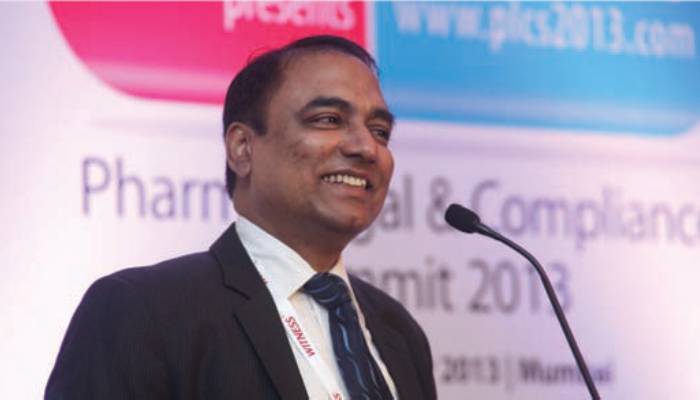
Summit Chair Dr. A.S. Kumar, General Counsel, Dr. Reddy’s Laboratories Ltd.,a licensed New York attorney and registered Indian lawyer, said pharma industry is rich in content and a platform like PLCS is like a unique learning experience. He added India is now recognizing, on the lines of the US and UK, the importance of pharma and legal compliance system because that is the real foundation the industry is built upon.
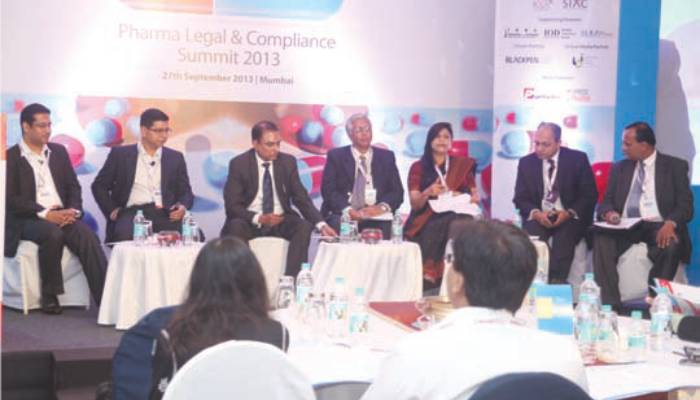
The Summit was comprised of interactive and engaging sessions. The first session dealt with practical strategies for driving compliance, and the members included Arjun Vaidyanathan, Partner and COO, Forensic KPMG India; Debolina Partap, Associate VP, Head (Legal), Wokhardt Group; R & D Health Care Compliance Officer, Johnson and Johnson (Global Clinical Operations); Marshall Mendonza, Independent legal professional; Sanjay Sharma, CFE, CPP, Regional Security Manager, Asia Pacific – Japan, Global Security Group, MSD – Merck, Sharp & Dohme Corp.; Mukundan Bharathan, Senior Legal Counsel, GlaxoSmithKline Pharmaceuticals Limited and Dr. A.S. Kumar, General Counsel, Dr. Reddy’s Laboratories Ltd.. Mr. Vaidyanathan, while speaking about the issues faced by the pharma industry today, said compliance is no rocket science and strategies related to it have to be simple, with its most important aspect today being third-party jurisprudence and monitoring, to illustrate how the canvas for compliance today has widened. Debolina, on the other hand, said it is essential for Indian multinationals with global presence to have independent vertical of compliance department. Legal department of these companies should not destroy the problem, but face them and deal with them instead of manipulating the issues, she added. The panellists contended compliance is a process that needs to be followed instead of being treated as a burden, leading to a company being set back by many years. These whistleblowers and their full-time activity can only strengthen the company, said Mr. Mendonza.
A.S. Kumar drew attention to an important area where there is non-compliance, i.e. data integrity. Since pharma industry is honour driven, Mr. Kumar said one has to be very careful about the papers produced by regulators to be relied on. Other area of noncompliance is quality, where to meet targets and stakeholder and business expectations, leakage problems are ignored. Compliance becomes important here rather than a company seeking easy ways out like bribery, contended Mr. Kumar.
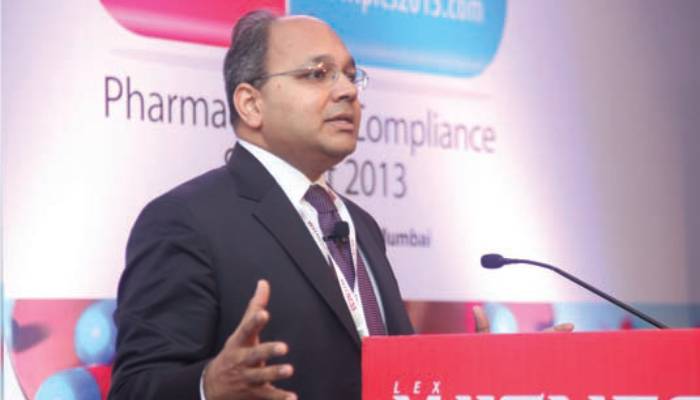
The session was followed with a presentation on FCPA within the pharma industry by Arjun Vaidyanathan, Partner and COO, Forensic KPMG India. Talking about FCPA compliance issues and enforcements on pharma industry, Mr. Vaidyanathan said one can learn from the present cases, for instance improper payment made by a subsidiary to foreign officials or by subsidiaries to foreign officials and routine bribes by subsidiaries which reveal that there are compulsions and business issues that make people indulge in fraud. Revealing the details of the KPMG Global Bribery and Corruption Survey 2011, Mr. Vaidyanathan said it was found that 7 out of 10 executives believe business cannot be done without engaging in bribery and corruption. The top compliance challenges, he said, are variations in country requirements and laws impacting bribery and corruption; auditing third parties for compliance and performing effectively due diligence on part of third parties or foreign agents. Vaidyanathan also spoke of factors facilitating bribery and corruption, including weak law enforcement, lack of effective regulatory and compliance mechanism, accepting bribery as acceptable behaviour and poor internal policies of a company. Finally contending why FCPA is relevant to pharma industry, Vaidyanathan said since it is a highly
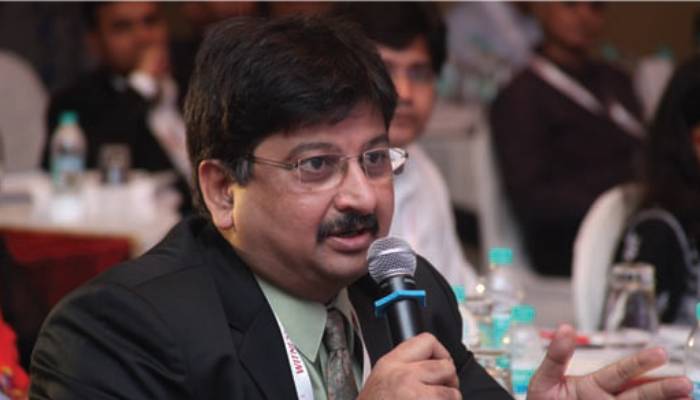
competitive industry and because of the nature of third-party nature of work and contract manufactures and licence issues, compliance issues are significant. Besides, since the industry deals largely and directly with the government medical system, it is highly regulated, making compliance relevant to the industry. Vaidyanathan argued for corporate policies on compliance with visible and serious implications in case they are not followed. Risk assessment of company operations, risk due to oversight of other partners besides regular training are key to following compliance, said Mr. Vaidyanathan, putting forward a framework of factors like communication, education, investigation, monitoring/auditing and enforcement that can ensure compliance.
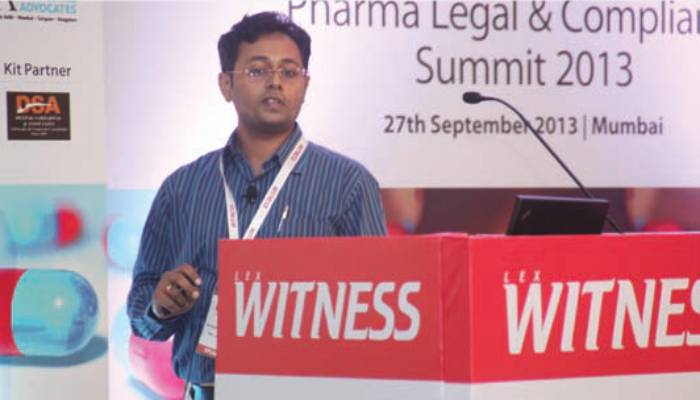
The third session centred on IPR — Industry Insights, Collaborative Innovation Mining: New Outlook to Face Pharma Patenting Issues. The same was presented by Amitava, Associate Partner, TMT Law Practice. Demystifying patenting issues, Amitava said biological resources, international deposition authority and biological and pharmaceutical patenting trains are nothing but to change the innovation mode. There are two basic thumb rules to these issues: a) innovation and b) invention. Amitava engaged the audience speaking about patenting within the Indian scenario of natural and artificial entities, and gene processes. He also shed light on modern biotechnological patents and exclusions of patenting biotechnological inventions in India within Section 3 (a), 3 (b) and 3 (c), besides Section 3 (d) of the India Patents Act which is most debatable today and also reflected on the claims that can be asserted under it. Amitava said patenting issues in the pharmaceutical sector are nothing “but a ballgame of drafting claims, because if someone has solid claim to make, one can hit a bull’s eye as far as patenting issues are concerned”. Amitava divulged the challenges and opportunities before the pharmaceutical sector today, among which he discussed evergreening, patent linkage and data exclusivity, bolar provision, parallel imports, compulsory licensing, claim infringement, the reverse engineering approach and litigation. He said these challenges actually provide opportunity for the pharma sector to innovate and design around. Amitava said a new market of around $ 30.4 billion will open by 2018 when almost all blockbuster drugs will expire, giving Indian pharma industries a chance to use their reverse engineering and design around approaches to take the fruit out of it.
Adding to this, A.S. Kumar said Indian pharma industry should be prepared to dig this gold and compliance is important here in terms of quality and data integrity.
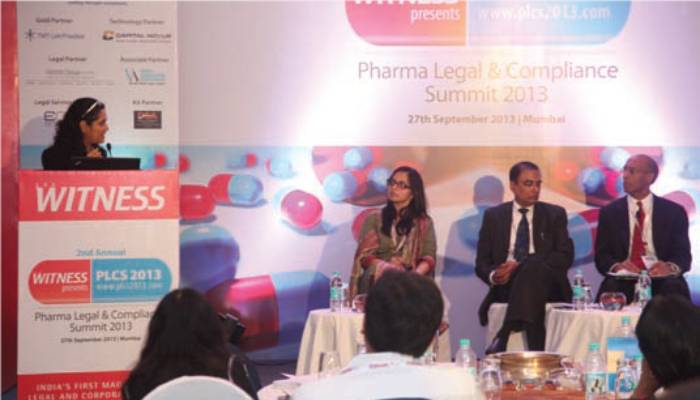
The next session discussed IPR: analysis of regulatory and legal updates, moderated by Gowree Gokhale, Head, Technology and Media Law Practice, Nishith Desai Associates. The panellists included Darshini Bhatt, AGM, IPR, Troikaa Pharmaceuticals Limited, Dr. Nanda Kumar, Member, Advisory Board, Lex Witness and Dr. A.S. Kumar, General Counsel, Dr. Reddy’s Laboratories Ltd.. The panel discussed Section 3 (d), patent drafting and therapeutic efficacy. Bhatt said efficacy cannot really be defined because it has a contextual meaning and, drawing upon the Supreme Court judgment on Section 3 (d), what can be inferred is that (i) Section 3 (d) stands as the law of the land which has to be obeyed.
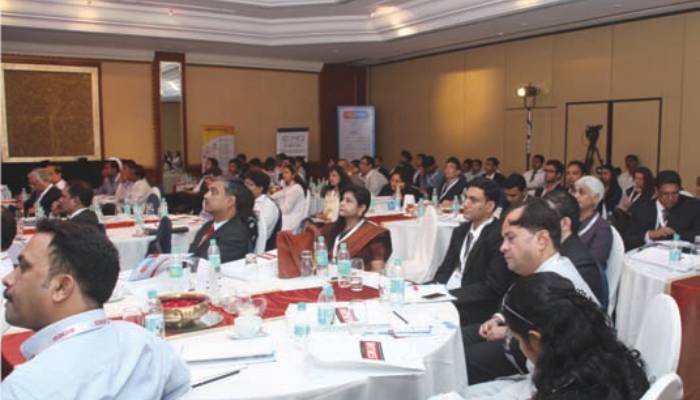
(ii) it has to be interpreted strictly and narrowly and (iii) efficacy under Section 3 (d) would always be therapeutic efficacy for pharma formulation. A.S. Kumar said the EU India Free Trade Agreement has been stalled for a year now because the EU wants supplementary protection certificates, and data exclusivity patent to the parent site, which means they see India as a site where patents are being marked unjustifiably. This means the Indian pharma cos. can lose out on their gold rush. Dr. Kumar, while talking about biologics, said the standard for patent protection is not as rigorous as for regulatory requirement. He uncovered the process: Invention is an interaction between advisor council and the scientist so one has a core invention, a commercial embodiment. When one wants to protect, he/she wants to protect this embodiment and one has to visualize what one wants to protect over the years, said Dr. Kumar’s, adding patent life is 20 years which is not too long in pharma industry as 8-10 years go in actually launching the product. With Section 3 (d), Dr. Kumar said it seemed India is looking to promote generic industry in keeping drugs available for everyone and not let market forces play in this regard.
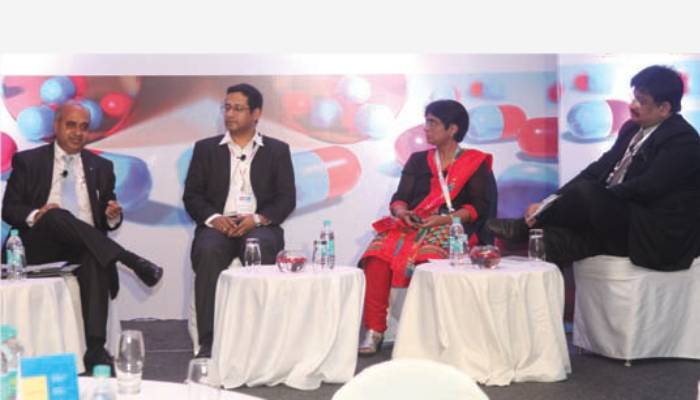
The next session was on Regulatory Update Open Session: Analysing the recent regulation, grey areas, business impact and implementation solutions the session was moderated by MM Sharma, Head-Competition Law and Policy, Vaish Associates Advocates while the panellists included Sofi Joseph, Regulatory Operations, Pfizer Limited; Mukundan Bharathan, Senior Legal Counsel, GlaxoSmithKline Pharmaceuticals Ltd. and Dr. Antani, Head-Pharma & Life Sciences, Nishith Desai Associates. MM Sharma said competition refers to not just competition in market, less regulation, and freedom for the market which reflects transition from a controlled economy to a market-based economy. Competition is basic to free market economy; it signifies attainment on not dynamic efficiency but allocative efficiency, which means efficiency for producer as well as welfare of consumer, he asserted. Competition constraints are three: demand side substitutability, supply side substitutability and market barriers, which competition law seeks to address. Competition law thus prevents malpractices and encourages healthy competition, argued Sharma. Sophie Joseph said reforms related to clinical trials, DPCO regime and schedule H1 reflect the concerns related to lacuna in pharma companies and regulations around it, which call for transparency and monitoring mechanisms.
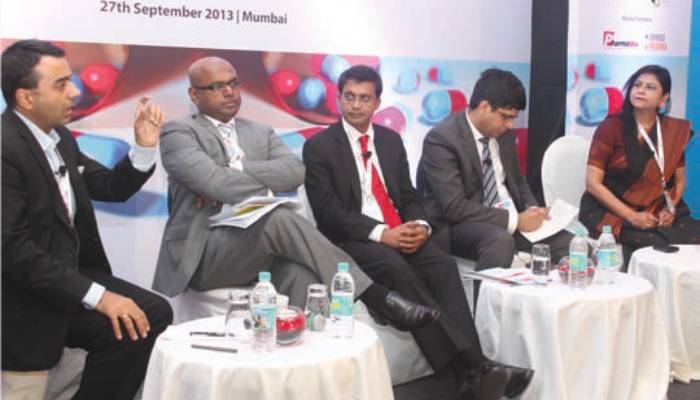
The last session dealt with contracts, agreement and dispute management moderated by Abhishek Malhotra, Partner, TMT Law Practice. The panellists were Debolina Partap, Associate VP, Head (Legal), Wokhardt Group; Sanjay Singh, Director (Corporate Finance) KPMG; Ajay Thomas, Registrar, LCIA (India) and Vivekananda N., Deputy Registrar & Head South Asia, Singapore International Arbitration Centre. Debolina, in an interactive session, actively engaged with the audience regarding contracts in pharma centring on CDA, its critical clauses like enforcement, governing law, interim relief and equitable relief clause. Sanjay Singh covered the transactional aspects of contracts, the chronology of events in M&A situations. He said it starts with CDA
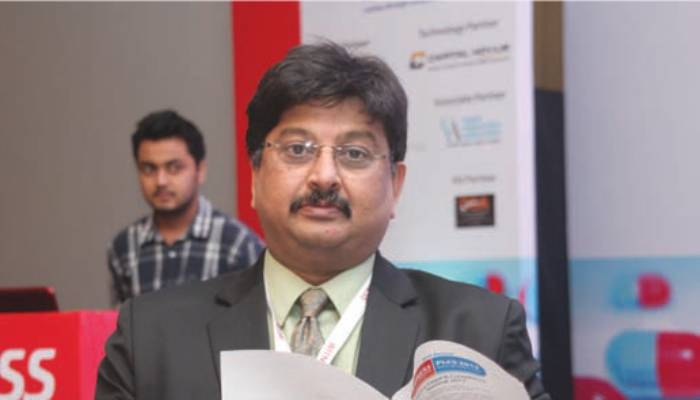
and NDA, subsequent to which the seller shares information with the buyer based on which buyer/s come with a letter of intent, a non-binding agreement. This is based on cost, income and market approaches and followed with due diligence stage, including legal, financial, tax etc. diligence when the buyer comes with buying offer, a legally binding offer. The typical timeline of this can be 8-12 months, Singh added. On why one should choose arbitration over court litigation to resolve contract disputes, Ajay Thomas said arbitration is viable, cost-effective and reliable. Even courts encourage arbitration, added Thomas, because among alternatives it is most binding and acceptable to settle disputes of commercial contracts. Vivekananda added that arbitration helps maintain confidentiality, which is key to pharma industry, and that it offers enforceability of decisions across 148 countries in cross-border contracts.
The summit was concluded with an eventful announcement of the lucky draw; drawn by Dr. Antani, Head-Pharma & Life Sciences, Nishith Desai Associates. Leena Patki, Plethico Pharmaceuticals won the draw for which the announcement was made by Shyam Grover, CEO, Lex Witness
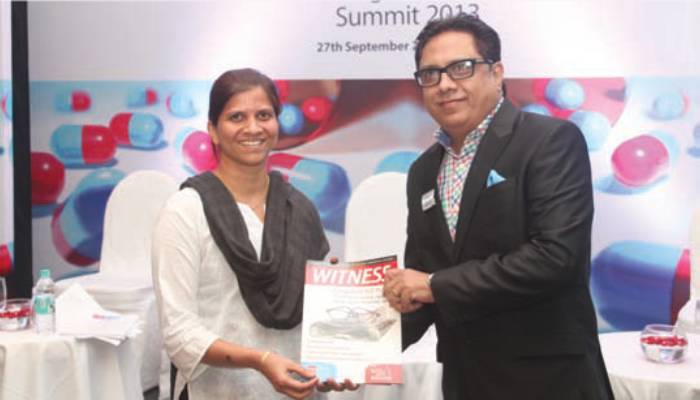
Curtains were drawn on PLCS with conclusion of the informative sessions, reaffirming belief that such events are best investments for stakeholders in pharma and legal industries as it helps them strategize their current and future response to the multiplying and complex challenges in the sector.
The LW Bureau is a seasoned mix of legal correspondents, authors and analysts who bring together a very well researched set of articles for your mighty readership. These articles are not necessarily the views of the Bureau itself but prove to be thought provoking and lead to discussions amongst all of us. Have an interesting read through.

Lex Witness Bureau

Lex Witness Bureau

For over 10 years, since its inception in 2009 as a monthly, Lex Witness has become India’s most credible platform for the legal luminaries to opine, comment and share their views. more...
Connect Us:


The Grand Masters - A Corporate Counsel Legal Best Practices Summit Series
www.grandmasters.in | 8 Years & Counting
The Real Estate & Construction Legal Summit
www.rcls.in | 8 Years & Counting
The Information Technology Legal Summit
www.itlegalsummit.com | 8 Years & Counting
The Banking & Finance Legal Summit
www.bfls.in | 8 Years & Counting
The Media, Advertising and Entertainment Legal Summit
www.maels.in | 8 Years & Counting
The Pharma Legal & Compliance Summit
www.plcs.co.in | 8 Years & Counting
We at Lex Witness strategically assist firms in reaching out to the relevant audience sets through various knowledge sharing initiatives. Here are some more info decks for you to know us better.
Copyright © 2020 Lex Witness - India's 1st Magazine on Legal & Corporate Affairs Rights of Admission Reserved